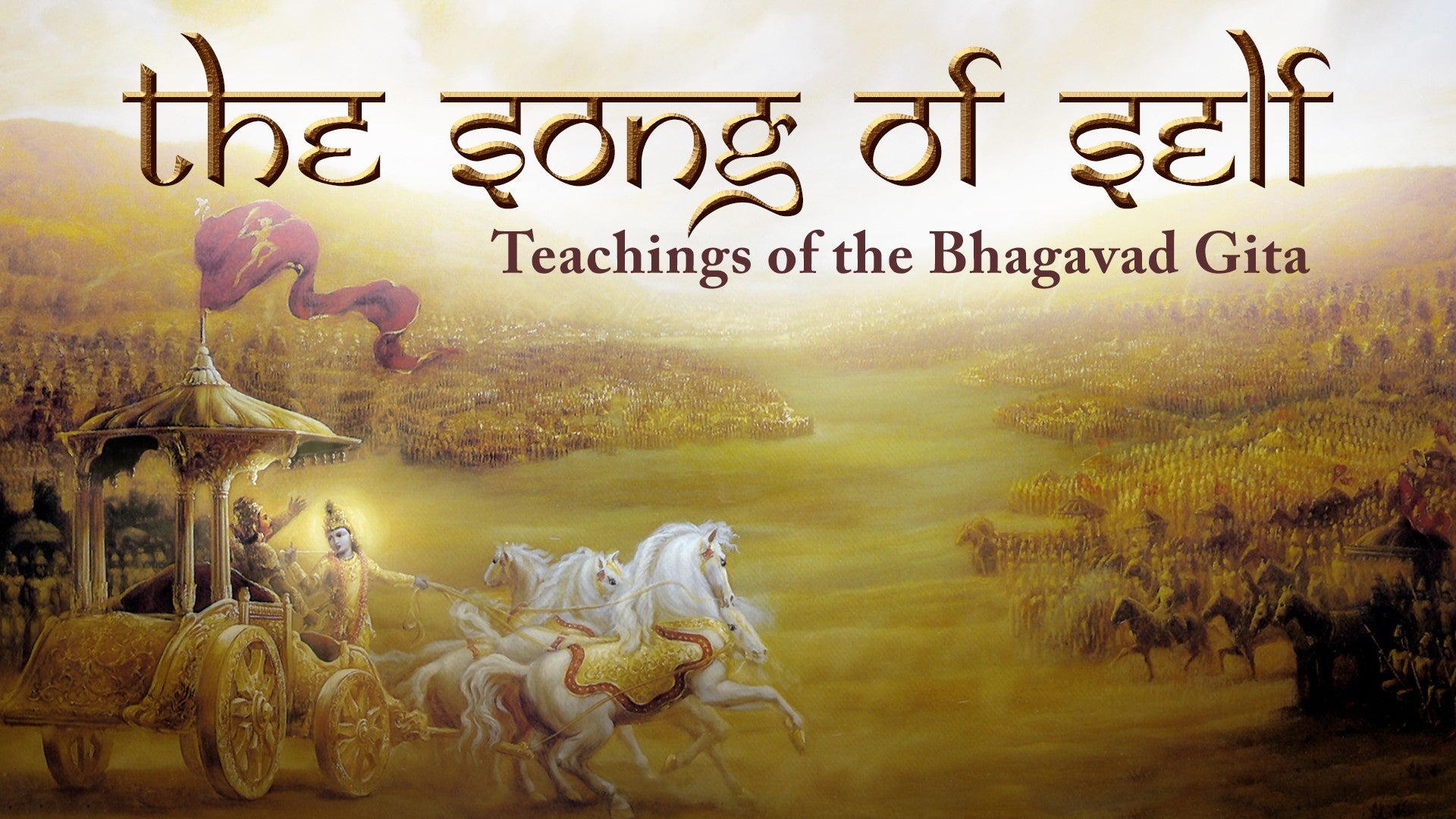Description
About This Video
Transcript
Read Full Transcript
So, now we come to the 69th verse, and the 69th verse of the second chapter is one of those verses in the Gita that is really very famous, you might say. It's often quoted, and it's also a verse that is one of those ones that's kind of a conundrum. Different commentators have different ideas about it. So here it is. Yani shasa eva bhutanam tasyan jagarti sanyami yasyan jagrati bhutani sani shapa shatomone.
So in this verse, we have this contrast of wakefulness and night. We have a contrast between the muni, munihe, of the muni, of the wise one, and salivutanam, or bhutan, which just means all beings are regular beings. So yani shasa eva bhutanam, when it is night for all beings, tasyan, in that night, jagrati sanyami. So sanyami means the sage who is embodying sanyama, in other words the yogin, the one who has truly harnessed all the powers of his or her individual awareness. So when it's night for all beings, in that night, the sanyami, the yogin, the one who has truly well harnessed his or her powers of awareness, jagrati is wakeful, is alert, is watchful.
Second line, yasyan jagrati bhutani. When bhutani, all beings, jagrati, are awake, sani shapa shatomone. For the sage who sees, that is night. So briefly again, the whole verse translated, when it's night for all beings, in that night, the sanyami, the yogi, is awake, wakeful, alert, watchful. When all beings are awake, it is the night for the wise one, or the wise one sees that as night.
So what does this mean? Work it out for yourselves. The idea is basically every verse in the Gita is an invitation to contemplation. And I say that because I really don't know what this verse means. I'm not sure.
I have some ideas which I'll share with you, but I really don't know. And this is the idea. And I also will confess, or not just confess, readily, happily admit that some verses over the years, as I've explored them and conspired them all, my understanding of them has shifted significantly. Now, this one, from the time I studied with my Sanskrit teachers, I was never really convinced I was getting all of it. And I'm still not convinced I've got all of it.
But just looking at it linguistically and expanding it a bit, here's what we can see. Yadishah sara Bhutanam. When it's night for all beings, tasyam, in that night, the sanyami, the yogi, is watchful, is wakeful. So it's the idea that ordinary people, most of us, it's very easy that a lot of the time we're not so wakeful. And so we miss a lot.
So also, ordinary people, one might say, generally seek that which is pleasurable and seek to avoid that which is displeasureable. But as the Yogan, who truly harnesses his or her powers, comes to a point of deep insight that allows him or her to recognize that whether it's pleasing or displeasing, there's actually something much deeper going on. Every opportunity is an opportunity, excuse me, every experience is an opportunity to tune in more deeply to the consciousness that is letting us have each and every experience. So it's the idea that sometimes, general people, we're not so inclined to that subtler realm of consciousness. But that subtler realm of consciousness is a wakeful realm for the wise one.
So this is something we can say about the first line, more or less. Vasyanjagari Bhutani, that in which ordinary folk are awake, are watchful, are vigilant, that's night for the wise one who sees. So oftentimes, commentators suggest that here, Krishna is saying, that the wise ones, they're not concerned with the same things that are a great concern to those of worldly inclination. Sometimes you can be, like once I heard somebody saying, he was sitting at dinner in a restaurant and he heard people on the next table talking about a particular problem in their life. And he was thinking, no, I'm not really concerned with those types of things.
And so he thought, oh, I'm much more enlightened than those people. But this second line, in Sanskrit, there is this capacity of words to be joined. So sarnishah pashatoh munihi. We can split this as sarnishah, sah is the first word, nishah the second word, pashatoh the third, anunihi the fourth, pashatoh munihi means the sage who sees. So that which the ordinary people are awake to, the sage sees that as the night, as dha and dha, because not being particularly interesting, we might say.
However, we could also split this, sah nishah apashatoh munihi. So the long r ending of nishah could include an u, which is part of the subsequent word. This is something that's possible in Sanskrit. And Sanskrit is designed to facilitate and allow multiple readings. This is one of its features, particularly in poetry and condensed forms like sutras.
But we find it through all the Sanskrit literature, many verses have layer upon layer of meaning. So here, if we take it as sarnishah apashatoh munihi, we could say that that in which all beings are awake for, for the wise one, when he is not seeing clearly, when he's apashita, when he's not seeing clearly, that is night. The idea being that even someone who has got to a high state of yoga, that person could still get rather conceited and carried away and miss the point and be rather condemnatory of other people who he thinks are less enlightened. The idea is when the wise one comes out of wisdom into baseless judgment, then that person condemns what is vital for other people as useless or trivial. But who is the sage to know that?
And when are you really a sage? Krishna will go on to tell us in beautiful, compelling detail. In verse, in chapter six, this is absolutely awe-inspiring verse, when Krishna talks about how the yogin has equivision. The yogin, the one who is sanyami, who has truly harnessed his power, looks upon everything the same. That doesn't mean he thinks everything is good, it means he looks on them all clearly, whether it's a learned, esteemed person, or somebody that the rest of the society sees as a pariah, the yogin looks on them as they are.
And with that clarity of vision, the yogin can see the essence. So remember earlier in the chapter we had that teaching, everything is all right. Krishna said to Arjuna in the 30th verse, you have no cause to mourn for any being. It's the idea, everything is unfolding as it needs to. But Krishna, I'm not sure what this verse really means as I mentioned, but Krishna could be saying here that even when you've really developed a lot of mastery over your senses, you can still spiral off into an unseen, blinkered attitude if you get on your high horse.
But as I mentioned, every verse is an invitation to contemplation. When it's night for all beings, in that night, the wise one is watchful, is awake. Again, even if we're not sure about the meaning, what's Krishna encouraging us towards, watchfulness? What is the night? It's the idea that when you come to the state of yoga, the pairs of opposites dissolve.
So night and wakefulness, what do you mean night and wakefulness? One is wakeful all the time if one's in that highly awakened state. If you're in the state of nirvana, it's the idea that you see everything with that equivision. So one thing I think that we can take practically from this rather enigmatic or perplexing verse is yes, be watchful. If you judge something as the night or empty, pay attention to that.
Why are you seeing it like that? And are there some things that you're giving a lot of attention to at the expense of others? I think this is another invitation in this verse. Are there some things that you give a lot of attention to and you're very alert to? And other things that you just push aside.
Perhaps if we give a little bit more alertness to those things we ignore ordinarily, we'll actually get close to the state of being a true sanyami, one who is actually drawing together all our powers. So also the idea in the second line that even a highly evolved practitioner doesn't always see clearly. And so Krishna is reminding us, even the advanced sage sometimes may be apashatah, but notice how this can be split in different ways. So the verse is almost inviting us to question the way we're reading it, to keep asking a question. And what is the Gita?
It's a dialogue, it's questions and answers. Yoga doesn't give us answers, it just keeps encouraging us to keep asking, searching penetrative sensible questions, questions that can help us come to know ourselves more. So with enigmatic verses like this, and there are many of them in the yoga teachings, if we don't understand them, sometimes they actually say, that's a good sign. Like in the Upanishads they say, one who thinks he knows doesn't know. One who thinks he doesn't know probably knows something.
The idea, we can't possibly know everything. Krishna's already made this very clear. Leon, you remember, he said, you know, we can understand what's manifest around us. We don't know what was before that, we don't know what's after it. And so the idea, the wise one, is humble and wakeful enough, paying close enough attention to remember, actually, I don't really know.
And with that sense of I don't know, it keeps us alert, it keeps us watchful, to perhaps bring that which is still in the dark or in the night into a place of greater vitality and greater alertness. So I hope that my attempted unpacking of this verse will be of some utility to cultivate that watchfulness.
The Song of Self: Bhagavad Gita: Chapter 2
Comments

You need to be a subscriber to post a comment.
Please Log In or Create an Account to start your free trial.









